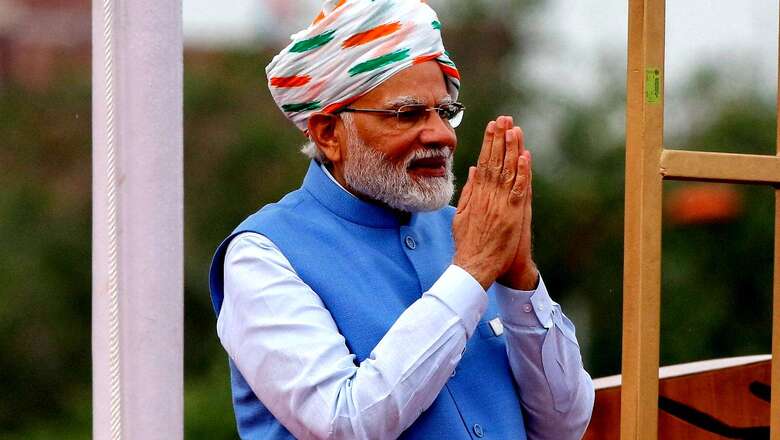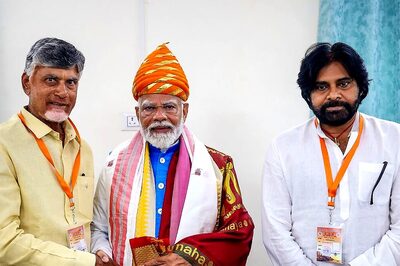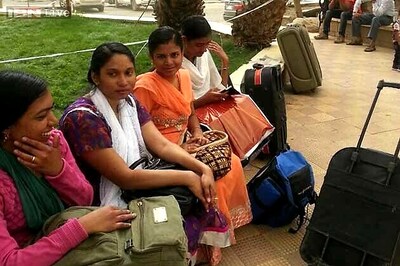
views
New India after 75 years of Independence no longer wants to wait ad infinitum to attain better job opportunities and essential living amenities. An aspirational society no longer seeks handouts from politicians, which are tantamount to instant and short-term monetary gratification.
In a progressive democracy, citizens seek to secure themselves through equal opportunities in the spheres of “justice, social, economic and political advancements”, which are words embedded in the preamble to the Constitution. The only catalyst for positive change is the promise of setting up a strong base for development grounded in social equity, the reverberations of which benefit one and all equitably for years to come.
However, as per the Directive Principles of the Constitution, political parties cannot be prevented from making pre-election promises that aim at eliminating socio-economic inequalities. Even Article 38 (2) mandates that the State will strive to minimise income inequalities across the board. Essentially, “all manifestos are a bargain between a party and the voters,” where one party’s freebie would be another party’s welfarist proposal, as both the terms are subject to infinite distortion.
It’s important to clarify that the Modi government in no way construes offering better public services as freebies, such as universal healthcare or improved utilities like ‘har ghar jal’, gas cylinders, or electrification of remote areas. In fact, the Centre targets a 100 percent saturation of such schemes by 2024. Such upgradation of utilities, relief and incentives to subsistence level strata are very different from luring voters with consumer durables, ornaments or white goods which dent the state’s resources, waste taxpayers’ money, and increase the cost of elections.
It is against this backdrop, let’s redefine the raging political slugfest between the Centre and states around what constitutes ‘merit’ versus ‘non-merit’ freebies, the latter being “analogous to outright bribery”. Profligate populism has led to spiralling debt in ratio to the GSDP of states, which is unsustainable in the long run because any unproductive debt burdens future generations and future governments with carry forward negative legacies.
Currently, ‘true debt’ of state governments stands at 34.5 percent of GSDP, while state governments deficit is at 5.5 percent of GSDP. Setting constitutional limits on the states’ ability to borrow is a vital step towards electoral reforms, as also necessary for macroeconomic stability. The Sri Lankan financial crisis has brought to the fore the risk of over-borrowing to finance subsidies, as the Centre’s debt to GDP ratio is half that of advanced countries, but its interest payments ratio is double theirs.
A vital function of planning public finances is to prioritise which sections of society need to be taxed, and thereafter how efficiently to redistribute national income by targeting sections of society that need relief and subsidies.
I would deem targeted measures like subsidised/free primary health and education as ‘Universal Social Programmes’ as they are aimed at conferring dignity and ease of living to the marginalised. Even proposals in moving towards a Universal Basic Income to those at subsistence level is surely a welfarist measure, which is why an Urban MNREGA is also being considered.
Critical welfare investments or disaster relief funding cannot be construed as freebies, and are deemed as ‘merit subsidies’, such as free Covid vaccination; the PM-Kisan subsistence level grant to small farmers; DBT; grassroots delivery of public services; the PDS through distribution of free food grains to 80 crore people post-Covid; and increased allocation for MGNREGA on need-based basis.
In fact, the UNDP just last month predicted that barring India, 71 million people in the developing world could sink into poverty due to rippling effects of recent black swan events and global inflation. What is salvaging India is the targeted subsidies to the poor, very different from freebies.
‘Non-merit’ subsidies account for 5.7 percent of GDP, out of which 4.1 percent emanate from state governments, like farm loan waivers, guaranteed Minimum Support Price or free water and electricity to farmers. Such freebies have only distorted the farm economy by incentivising planting of crops that come under MSPs, and incurred unsustainable losses for discoms. As farmers constitute a sizeable chunk of voters, they are aware of their bargaining power in demanding constant concessions and subsidies. Agriculture is a low-paying sector, yet it accounts for 17 percent of GDP, and employs 40 percent of the workforce, making it an imperative to subsidise the sector.
The tendency towards profligate over-commitment of public finances in manifesto’s during electioneering must be delegitimised. Just as freedom of speech can never be an absolute right and needs self-limiting checks and balances on hate speeches for example, discretionary announcements of freebies cannot be an absolute right of politicians when electioneering, but must be based in proportion to the fiscal health of the state. Political parties pre-polls must be compelled to be transparent and indicate how exactly they will raise the resources to fund promises made by them in their manifestos.
The fair, just, timely and appropriate deployment of scarce public finance is a priority for the Finance Minister and central policymakers. The problem is that most states today are in a state of precarious finances due to high debt, like Punjab or Bihar, as compared to economically vibrant, self-sustaining and profitable states like Maharashtra, Karnataka, Gujarat or Haryana. Doling out freebies at elections must be in proportion to the state’s financial profits or losses, and in proportion to the state’s GSDP. India’s lowest per capita income states need increased developmental funding to create jobs instead of scarce financial resources being spent on freebies.
Besides, money spent on freebies yields no returns in investments. This is in sharp contrast to justifiable budgetary spending towards welfarist social sector schemes; or contingency spending for disaster management to offer relief; or allocations for capital expenditure (Capex). Raising gross national productivity and growth is the only way to generate revenues needed for building national physical and manpower assets, while quantitative allocations towards quasi-public services like education, health, quality air, water and sanitation which help build public capacity.
‘Capex’ is money well allocated, as it yields gainful employment, raises the living conditions of citizens, raises the GSDP of states, and enhances the per capita incomes of its citizens. Clearly, this constitutes in corporate terms what is called ‘organic growth’ that is self-sustaining, as it earns a return on investment.
India is moving towards becoming a welfarist state, but fiscal prudence should prevail over short-term political gains. What is needed is a long-term view in policymaking at the federal level on lines of the Fiscal Responsibility and Budget Management Act.
All government spending is financed through tax revenues or external borrowing, so when expenditure exceeds revenues, it compels the government to impose a higher burden on the 10 percent of the taxpaying population.
As regards criticism over public sector banks writing off loans and being considered a form of Central freebie as it comes under the public exchequer, according to data from the RBI, the asset quality of banks has vastly improved with a continuous decline in non-performing assets ratio from 7.5 percent to 5.7 percent in the banking system since the last year.
The second criticism on freebies given by the Centre is the cut in corporate taxes, considered as favouring the rich. To the contrary, cut in corporate taxes, as even the Productivity Linked Incentive Scheme have multiplier effects in incentivising production and job creation, and are much needed to make India a favoured global investment destination which will raise GDP and generate employment.
As each state has its specific socio-economic inequities and region-specific priorities, therefore freebies, incentives and welfare schemes are per force customised to localised need-based requirements. In conclusion, while some discretion should remain with political parties on determining handouts, let the expert panel suggested by the Supreme Court throw up viable suggestions and make this a part of electoral reforms.
Bindu Dalmia is ex-Chairperson for the NCFI, Niti Aayog. Views expressed are personal.
Read the Latest News and Breaking News here




















Comments
0 comment